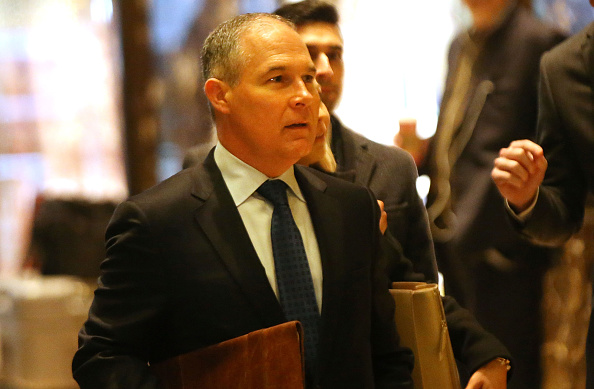Shortly before reversing pending ban on a pesticide, EPA chief met with CEO of chemical company selling it


A free daily email with the biggest news stories of the day – and the best features from TheWeek.com
You are now subscribed
Your newsletter sign-up was successful
Environmental Protection Agency head Scott Pruitt met with Dow Chemical CEO Andrew Liveris on March 9, and 20 days later, he reversed the EPA's decision to ban the spraying of food with a Dow chemical that studies show can interfere with the development of children's brains, The Associated Press reports.
AP received Pruitt's schedule through a Freedom of Information Act request. Pruitt and Liveris were both speaking at an energy industry conference in Houston when the 30-minute private meeting occurred. EPA spokeswoman Liz Bowman told AP that the pair did not discuss chlorpyrifos, the chemical in question, and were just "briefly introduced." Liveris leads a White House manufacturing working group, and Dow Chemical gave $1 million to help underwrite President Trump's inauguration.
EPA scientists have reviewed the chemical, and found that ingesting even the smallest amount can harm the brains of fetuses, infants, and children. The American Academy of Pediatrics is calling on Pruitt to take the chemical off the market, saying in a statement: "There is a wealth of science demonstrating the detrimental effects of chlorpyrifos exposure to developing fetuses, infants, children, and pregnant women. The risk to infant and children's health and development is unambiguous."
The Week
Escape your echo chamber. Get the facts behind the news, plus analysis from multiple perspectives.

Sign up for The Week's Free Newsletters
From our morning news briefing to a weekly Good News Newsletter, get the best of The Week delivered directly to your inbox.
From our morning news briefing to a weekly Good News Newsletter, get the best of The Week delivered directly to your inbox.
Chlorpyrifos is similar to a chemical developed during World War II as a weapon, AP says, and traces of it are often found in drinking water. Dow sells about five million pounds of the chemical in the U.S. annually, and in 2015, the Obama administration proposed banning its use on food. In April, AP reported that Dow was urging the Trump administration to "set aside" findings made by federal scientists that organophosphate pesticides like chlorpyrifos are harmful to threatened and endangered species.
A free daily email with the biggest news stories of the day – and the best features from TheWeek.com
Catherine Garcia has worked as a senior writer at The Week since 2014. Her writing and reporting have appeared in Entertainment Weekly, The New York Times, Wirecutter, NBC News and "The Book of Jezebel," among others. She's a graduate of the University of Redlands and the Columbia University Graduate School of Journalism.
-
 Local elections 2026: where are they and who is expected to win?
Local elections 2026: where are they and who is expected to win?The Explainer Labour is braced for heavy losses and U-turn on postponing some council elections hasn’t helped the party’s prospects
-
 6 of the world’s most accessible destinations
6 of the world’s most accessible destinationsThe Week Recommends Experience all of Berlin, Singapore and Sydney
-
 How the FCC’s ‘equal time’ rule works
How the FCC’s ‘equal time’ rule worksIn the Spotlight The law is at the heart of the Colbert-CBS conflict
-
 TikTok secures deal to remain in US
TikTok secures deal to remain in USSpeed Read ByteDance will form a US version of the popular video-sharing platform
-
 Unemployment rate ticks up amid fall job losses
Unemployment rate ticks up amid fall job lossesSpeed Read Data released by the Commerce Department indicates ‘one of the weakest American labor markets in years’
-
 US mints final penny after 232-year run
US mints final penny after 232-year runSpeed Read Production of the one-cent coin has ended
-
 Warner Bros. explores sale amid Paramount bids
Warner Bros. explores sale amid Paramount bidsSpeed Read The media giant, home to HBO and DC Studios, has received interest from multiple buying parties
-
 Gold tops $4K per ounce, signaling financial unease
Gold tops $4K per ounce, signaling financial uneaseSpeed Read Investors are worried about President Donald Trump’s trade war
-
 Electronic Arts to go private in record $55B deal
Electronic Arts to go private in record $55B dealspeed read The video game giant is behind ‘The Sims’ and ‘Madden NFL’
-
 New York court tosses Trump's $500M fraud fine
New York court tosses Trump's $500M fraud fineSpeed Read A divided appeals court threw out a hefty penalty against President Trump for fraudulently inflating his wealth
-
 Trump said to seek government stake in Intel
Trump said to seek government stake in IntelSpeed Read The president and Intel CEO Lip-Bu Tan reportedly discussed the proposal at a recent meeting
